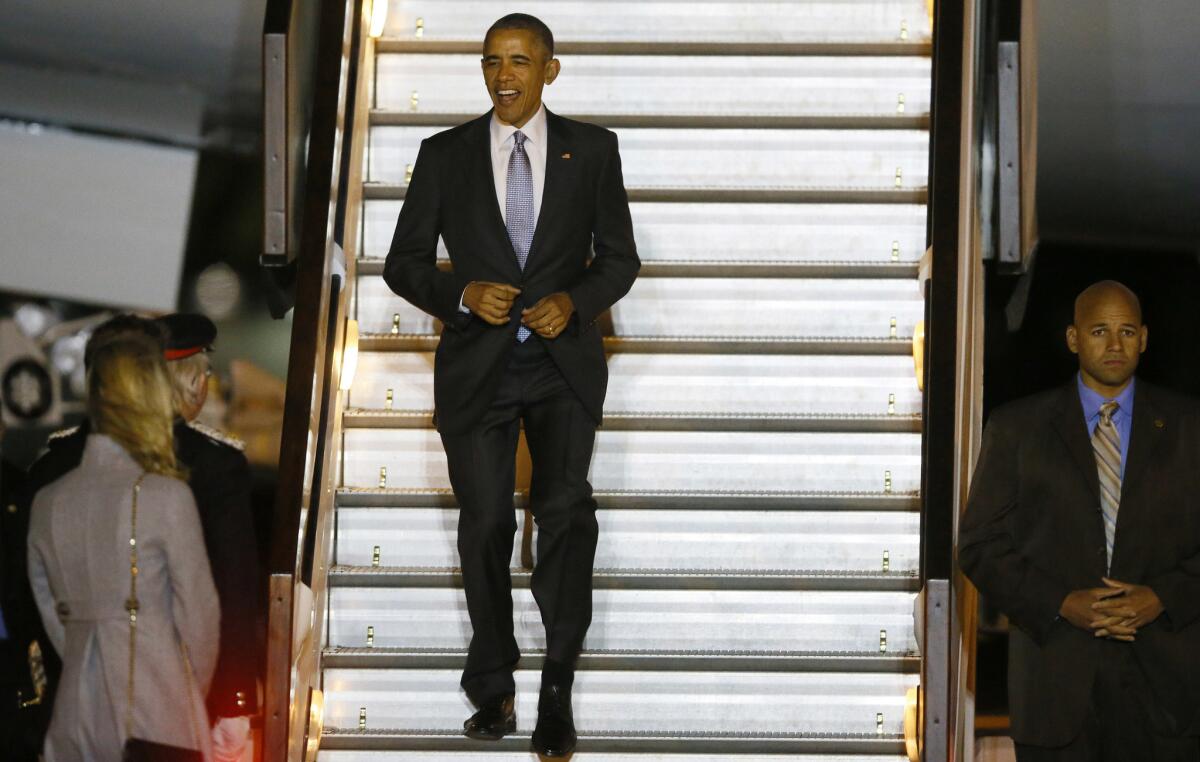The presidential election has Obama explaining it to concerned foreign leaders

- Share via
Reporting from London — The American presidency is often called the most powerful job in the world. And perhaps in this election, more than most, many outside the U.S. would like a say in its outcome.
Concern about Donald Trump’s campaign rhetoric, and its apparent resonance among large swaths of the American public, has become a regular feature of President Obama’s interactions with foreign counterparts and appears likely to trail him as he began something of a farewell tour of Europe on Friday.
“It’s fascinating the degree to which the single most important question I’m asked these days from other world leaders is, ‘What’s going on with your elections?’ ” Obama told interviewer Charlie Rose this week, calling the drama of the Republican race “the tip of a broader iceberg of dysfunction that we’ve seen.”
White House aides at times seem weary of questions about the extent to which the campaign is figuring in to Obama’s conversations with foreign leaders. But Obama and Vice President Joe Biden often have acknowledged the frequency of the inquiries, sometimes in jest. Toasting Prime Minister Justin Trudeau at a state dinner, he credited Canadians who “have, so far, rejected the idea of building a wall to keep out your southern neighbors.”
Election 2016 | Live coverage on Trail Guide | Track the delegate race | Sign up for the newsletter
A more immediate campaign has dominated voters’ attention here — the June referendum over whether the United Kingdom should remain part of the European Union — but U.S. politics are also front of mind. After the New York primary this week, the anchor of the BBC’s evening news program dissected the latest delegate counts with the wonky precision of an MSNBC correspondent, albeit in a tailored suit rather than professorial sweater.
At a news conference here Friday after Obama met with Prime Minister David Cameron, an American reporter asked Cameron whether he might want to advise American voters what to do when it comes to Trump.
“That was so predictable!” Obama admonished. Cameron deflected the question but acknowledged he has commented before. In December, after Trump called for a ban on Muslim immigration to the U.S., Cameron said his remarks “were divisive, stupid and wrong.”
The uproar over Trump’s proposed immigration ban was but one that attracted notice beyond U.S. borders. Foreign diplomats have been spotted on the campaign trail, scouting out early primary states and attending debates and campaigns to document other potential thorny policy pronouncements for dispatches back home.
“Europeans watch and analyze America politics extremely closely,” said Heather Conley, director of the Europe Program at the Center for Strategic and International Studies. “I think their evolution in our presidential election has been, ‘What is this? This will settle down,’ to, ‘Oh, dear God, what is happening?’ ”
The British Parliament debated over whether to allow Trump to enter the country, Conley noted. A December survey conducted by Ipsos-MORI found that 74% of British adults had an unfavorable view of the billionaire. Fifty-six percent viewed Hillary Clinton favorably.
Clinton, a former secretary of State, said last month that the concern among foreign leaders over a Trump presidency was so pronounced that some had asked her whether it would help if they publicly endorsed her.
“I am like, ‘No, this is up to Americans, thank you very much,’ ” she said at an Ohio town hall.
As much as any particular issue, Obama has focused on U.S. foreign policy most when discussing the stakes of the election.
In February, after hosting a summit of southeast Asian leaders at Sunnylands in California, Obama focused on his role as commander-in-chief in explaining why he was confident Trump could not win.
The job requires someone who has the nuclear launch codes and “is often responsible for not just the United States of America but 20 other countries that are having big problems or falling apart,” he said in explaining why he was confident Trump could not win.
“The American people are pretty sensible, and I think they’ll make a sensible choice in the end,” he said.
For Obama, sharing the curiosity and concern of foreign leaders over the state of the campaign could be a useful political device for a president who would prefer a fellow Democrat succeed him. And Clinton, as Obama’s former chief diplomat, could benefit if the country ultimately views his foreign policy legacy favorably enough to vote for her to continue a version of it.
But the uncertainty over what course his successor might take also could have immediate consequences for Obama’s ability to conduct foreign policy.
It could worsen his odds of gaining new commitments for any long-term strategies to target Islamic State, for instance, said James Carafano, vice president of foreign and defense policy studies for the conservative Heritage Foundation.
“There’s a lot of uncertainty in the region about, ‘What next?’ What next from President Trump, what next from President Cruz, what next from President Clinton?” he said. “There’s a reluctance for people to sign up for something on a campaign that may last the next couple of months with no clear picture of what’s going to happen after that.”
Twitter: @mikememoli
ALSO:
9/11 attacks reemerge as a critical test of U.S.-Saudi relationship
How are Pennsylvania’s GOP delegates selected? Most voters don’t have a clue
UPDATES:
11:58 a.m.: This story was updated with comments from British Prime Minister David Cameron.
This story was originally published at 7:27 a.m.
More to Read
Sign up for Essential California
The most important California stories and recommendations in your inbox every morning.
You may occasionally receive promotional content from the Los Angeles Times.











